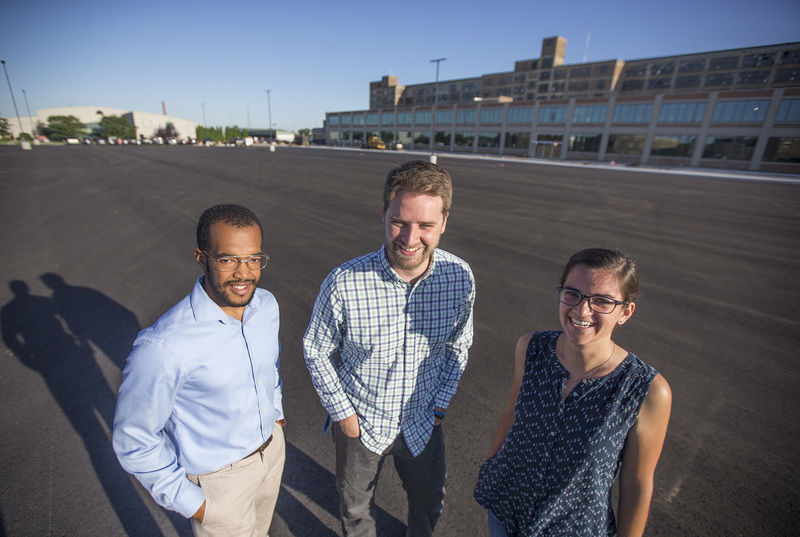By Erin Blasko
South Bend Tribune, Ind.
WWR Article Summary (tl;dr) A new venture called “Invanti” will help aspiring entrepreneurs identify opportunities for for-profit businesses. The first cohort of six entrepreneurs will gather this fall to identify problems and solutions around the issue of financial inclusion — the idea that low-income segments of the population should have the same access to financial products and services as their wealthier counterparts.
SOUTH BEND
Maria Gibbs spent a year managing field staff in Rwanda, Haiti, Panama and Nicaragua for Bridges to Prosperity, a nonprofit that builds footbridges over impassable rivers, and she recently earned her doctorate in civil engineering from the University of Notre Dame.
But instead of chasing a career in engineering or international development, the Duke University alumna has decided to put down roots in South Bend.
Along with Dustin Mix, with Notre Dame’s ESTEEM Program, Gibbs recently founded Invanti, a social endeavor that seeks to “catalyze aspiring entrepreneurs to solve big problems.”
The name references Avanti, the innovative sports coupe manufactured by the Studebaker Corp. in the 1960s, evoking the city’s rich industrial heritage and its long history of innovation.
“Avanti in Italian means charge forward or charge ahead,” said Gibbs, a dual citizen of Italy and the U.S. “But we also wanted to mash together innovation, invest and invent.”
At its most basic, the venture will help aspiring entrepreneurs identify opportunities for for-profit businesses that create impact and profit by connecting them with the right information and the right people, Gibbs said.
The motto: Find a problem. Create a solution. Build a company.
The first cohort of six entrepreneurs will gather this fall to identify problems and solutions around the issue of financial inclusion — the idea that low-income segments of the population should have the same access to financial products and services as their wealthier counterparts.
“A lot of financial products and services are designed with middle- and upper-class consumers in mind, so you don’t see a lot of financial products that make a lot of sense for low-income Americans,” Gibbs said.
Members will work with community partners including the United Way and Bridges Out of Poverty to identify specific barriers to financial inclusion, Gibbs said, and to develop for-profit business ventures that apply technology to the problem.
Gibbs cited TIO Networks, a startup that helps people without checking accounts pay bills in cash via self-service kiosk, retail walk-in, mobile and web solutions, as an example.
“The entrepreneurial solution allowed people to pay their bills on time, and the company just ended up getting acquired by PayPal” for $233 million, Gibbs said of TIO.
The cohorts will meet for six months, with the goal of creating one or more “social ventures” — startups that marry the social mission of a nonprofit with the market-driven approach of a business.
Paraphrasing Mayor Pete Buttigieg, Gibbs described South Bend as fertile ground for such an endeavor: big and diverse enough to have the complexities of a big city, yet small and nimble enough to pursue creative solutions.
“We’re really excited to be in South Bend and be part of what’s happening in the broader (entrepreneurial) ecosystem,” she said.
John Gibbons shares that excitement.
A Notre Dame graduate who has spent the past three years working for Babajob.com, a jobs site for blue-collar workers in India, Gibbons is among three fellows who have already committed to the financial inclusion cohort.
He learned of the opportunity via a Google group for social entrepreneurs.
“South Bend is such a phenomenal place for things to happen because the town is on the rise,” Gibbons said by phone from Bangalore, the “Silicon Valley of India.” “It seems to be a great environment to try something like this with a great network to support it.”
Still, he never expected to return to the area, he said.
“I really liked South Bend when I was a student and everything, but I always assumed I’d be in India or go somewhere else abroad or to New York or something,” said Gibbons, who studied Chinese, political science and international development at Notre Dame. “I never expected such an opportunity would present itself.”
As part of the first cohort, Gibbons, 25, will receive a small stipend to help with living expenses.
He said he has yet to make living arrangements, but may end up sharing space with others in the group to build relationships, promote collaboration and save on rent.
“My sincere hope is that multiple companies can be started from this,” he said. “Hopefully some sustainable organizations can crop up that are mission-driven and focus on promoting financial inclusion.”
As a partner in the endeavor, enFocus, a nonprofit innovation organization with ties to Notre Dame, has agreed to fund the first cohort, Gibbs said, however, “long term, we’re playing around with a few business models.”
She said the venture will likely locate somewhere near the Renaissance District, the 80-block technology district south of downtown that includes Ignition Park, Union Station Technology Center and the former Studebaker complex.
“What we’re really excited about is just thinking about the caliber of people we’ve been able to recruit,” Gibbs said, “and imagining them in South Bend, in this playground of entrepreneurs, hunting around for ideas that will create impact.”
For more information, visit www.invanti.co.














































































































































































































































































































































































